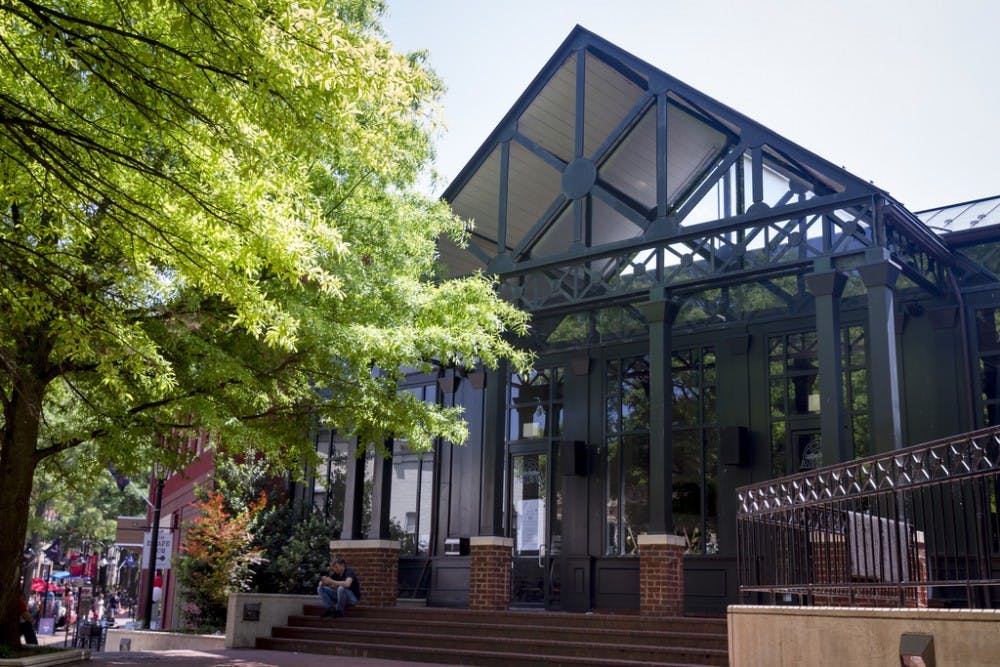The Main Street Arena on the Downtown Mall has held a prominent position in Charlottesville as the only ice skating rink in the local area since 1996. In addition to being open to the general public for ice skating, the rink served community sports teams and was a local venue for concerts, parties and other special events. Main Street Arena also served the needs of University ice sports teams, including the men's ice hockey club team, women's ice hockey club team and the figure skating club team.
However, after being sold last year, Main Street Arena officially closed its doors to the public this past Sunday, April 1. It was announced in March 2017 that Main Street Arena was purchased by Jaffray Woodriff and Taliaferro Junction, LLC, who plan on demolishing the rink and in its place, building a multi-use office building, called the Charlottesville Technology Center.
The closing of Main Street Arena will impact University clubs who have relied upon the rink for practices, games and shows. The men’s and women’s ice hockey club teams and the figure skating club team are all in the process of finding alternate arrangements.
Sarah Walshak, women’s ice hockey president and assistant captain, said that her team is planning on travelling to a rink in Short Pump near Richmond. Brenna Monk, president of the figure skating club team, reported that her team is also reaching out to rinks in Richmond and Lynchburg. Men’s ice hockey director of community outreach Joshua Katz, is not sure what his team will do yet but is hopeful that a new arena will be built in Charlottesville in the near future.
“This came very out of the blue, so I’m not sure on more details,” Monk said. “But that’s definitely an option that we’re going to look into because if U.Va. could build a rink that would be, I think, really awesome.”
None of the clubs have made definite arrangements yet with another rink, so the situation remains uncertain. If the clubs do have to practice at another rink during the upcoming year, they will face issues with transportation, practice time and additional expenses.
Moving to the rinks in Richmond or Lynchburg would require about an hour-long commute each way. The clubs would probably need to arrange carpools to travel to practices, games and competitions at these rinks, and transportation costs would increase. Additionally, renting reserved time at the new rinks could be more expensive than at Main Street Arena.
The clubs primarily pay for their expenses with member dues and funding from the University. The men’s ice hockey team also has a few sponsors, and the women’s team also promotes donations and holds fundraisers. However, the University can only provide limited funding, so the clubs will likely need to increase member dues and fundraisers or find new sources of funding given possible expense increases, especially in transportation.
Finding new practice times that work for club members’ schedules will also pose difficulties if they have to travel out of Charlottesville. At Main Street Arena, the figure skating club practiced at 6 a.m., but with additional commuting time, this may no longer be possible. Practice time may also have to be cut if the teams have to spend longer travelling back and forth. The women’s ice hockey club team practiced once a week at Main Street Arena but may be unable to practice this frequently at a rink farther away.
Katz is also worried about losing the support of the University community if his team has to travel to a farther location for home games.
“I think the main issue is just going to be that we’re going to lose a lot of our attendance and fan base,” Katz said. “That’s something the team is really going to look to improve on for the coming year.”
However, Katz is confident that his team will continue to practice and compete even in the midst of these challenges.
“If worse came to worse and we had to practice in Richmond, I think everyone’s dedicated to the team, and it wouldn’t be an issue,” Katz said. “We might have one fewer practice or it might cut back on some games, but it’s a strong core. And we’re all pretty dedicated to keeping the team alive.”
These sentiments were echoed by Walshak about the women’s ice hockey team.
“Most people seemed pretty dedicated to the idea that this is something they want to continue doing,” Walshak said. “It’s something they really love, so people seem willing to go the extra mile and to pay the extra money, especially because we have hopes of a new rink soon.”
Monk also expressed optimism in the face of this change.
“Obviously we are at U.Va. for academic purposes and the skating team is an amazing added plus and has really changed, I think, a lot of our collegiate experience, but it’s going to be a challenge,” Monk said. “But I think it’s possible, and I think we’ve created a good foundation for the club moving forward, which will help tremendously.”







